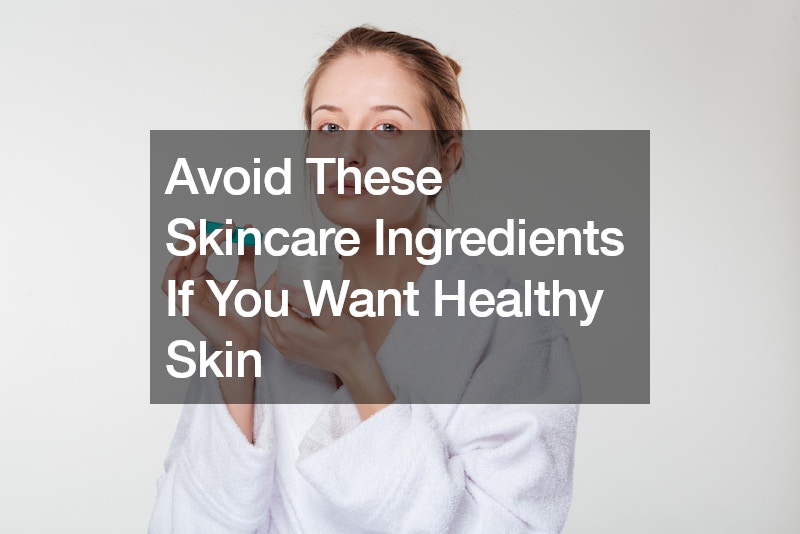Your skin is your body’s largest organ, and taking care of it should be a top priority. However, with the plethora of skincare products available on the market, it can be challenging to navigate what’s best for your skin. While some ingredients promise miracles, others can do more harm than good. To ensure your skincare routine promotes healthy, radiant skin, it’s crucial to steer clear of certain ingredients. Here are some key ingredients to avoid if you want to maintain optimal skin health:
Methyl Isothiazolinone
This preservative, commonly found in water-based products like shampoos, can lead to contact dermatitis. While it’s intended to prevent contamination, it often causes skin irritation and allergies.
Opt for products with alternative preservatives that are less likely to trigger reactions.
Although paraben is less likely to cause problems compared to methyl isothiazolinone, it’s still important to be mindful of its presence in skincare products. Some individuals may have sensitivities or allergies to parabens, although they are generally considered safer alternatives in terms of preservatives. Opting for a paraben free face wash can be a wise choice, especially for those with sensitive skin or concerns about potential health risks associated with certain preservatives.
Fragrance
While it may make skincare products smell pleasant, fragrance is a common culprit for skin allergies and irritation. Some fragrance ingredients can even lead to hyperpigmentation and photosensitivity, making your skin more prone to sun damage. Choose fragrance-free products, especially for leave-on skincare items like moisturizers and sunscreens.
Citrus Oils
Products containing citrus oils like lemon, lime, and bergamot can increase your skin’s sensitivity to sunlight, leading to irritation and potential discoloration. These oils often contain compounds that can oxidize and cause allergic reactions. Be cautious when using products with citrus oils, especially if you plan to spend time in the sun.
Neomycin
Found in antibiotic ointments like Neosporin, neomycin is known to cause contact dermatitis in many individuals. Despite its widespread use, neomycin isn’t the most effective antibiotic and can exacerbate skin issues. Opt for alternative wound healing products without neomycin to avoid potential allergic reactions.
Balsam of Peru
This fragrance ingredient is highly sensitizing and can lead to severe contact dermatitis. It’s often found in diaper rash creams, posing a risk to delicate baby skin. Avoid products containing balsam of Peru, especially if you have sensitive or reactive skin.
Essential Oils
Essential oils may seem enticing due to their natural origins, but it’s essential to recognize their potential drawbacks. Compounds found in essential oils, such as limonene, linalool, eugenol, and citronellol, can mimic the effects of synthetic fragrances, leading to skin irritation and sensitization. These oils, commonly derived from plants, are often included in skincare products for their aromatic properties and perceived therapeutic benefits. When selecting skincare products, especially if you have sensitive skin, prioritize options that are formulated without essential oils to minimize the risk of irritation and allergic reactions.
Synthetic Dyes
Certain synthetic dyes derived from coal tar, such as D&C Red 3, 30, 36, 40, and 27, can aggravate acne-prone skin. These dyes may exacerbate inflammation and lead to breakouts. Furthermore, synthetic dyes not only pose risks for those with acne-prone skin but can also be problematic for individuals with sensitive skin conditions such as rosacea or eczema. Synthetic dyes can trigger irritation, further compromising the skin’s barrier function. By choosing dye-free skincare alternatives, you can minimize the risk of adverse reactions and promote overall skin wellness.
Coconut Oil
While coconut oil is praised for its moisturizing properties, it can be comedogenic for some individuals, leading to clogged pores and breakouts. If you have acne-prone skin, consider avoiding products containing coconut oil to prevent exacerbating your skin concerns.
Facial Scrubs
Mechanical facial scrubs containing abrasive particles can cause micro-tears in the skin, leading to irritation and increased sensitivity. These scrubs may also disrupt the skin’s moisture barrier, resulting in dryness and inflammation. Consequently, excessive use of facial scrubs can exacerbate existing skin conditions such as acne and rosacea. By incorporating gentle exfoliants like chemical exfoliants or enzymatic scrubs into your skincare routine, you can achieve smoother, clearer skin without the risk of irritation or damage.
Low SPF Tanning Products
Tanning products with low SPF values provide minimal protection against UVB rays while offering no defense against UVA rays. This can lead to sun damage, premature aging, and an increased risk of skin cancer. Choose broad-spectrum sunscreens with adequate SPF protection to shield your skin from harmful UV radiation.
In conclusion, being mindful of the ingredients in your skincare products is essential for maintaining healthy skin. By avoiding harmful ingredients and opting for gentle, effective alternatives, you can promote skin health and achieve a radiant complexion. Always read product labels carefully and consult with a dermatologist if you have specific skin concerns or sensitivities. Your skin deserves the best care possible, so make informed choices to keep it healthy and glowing.
.


